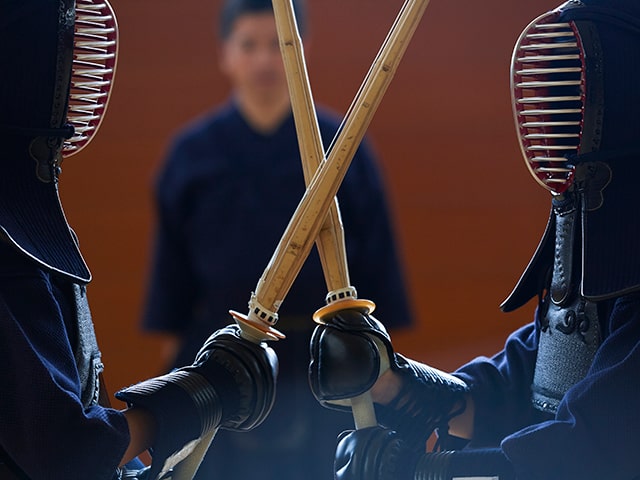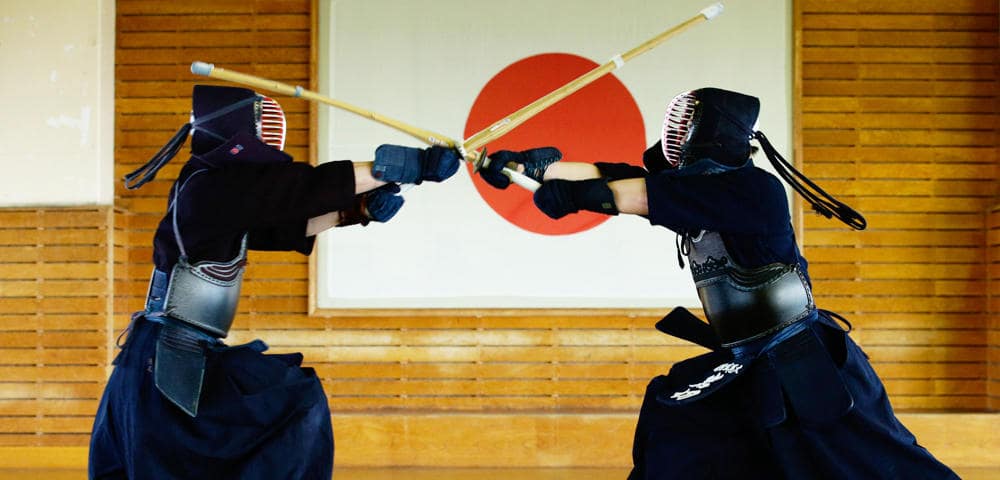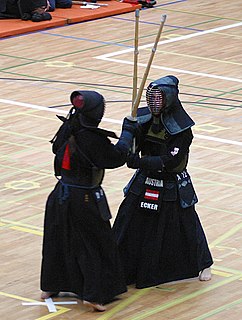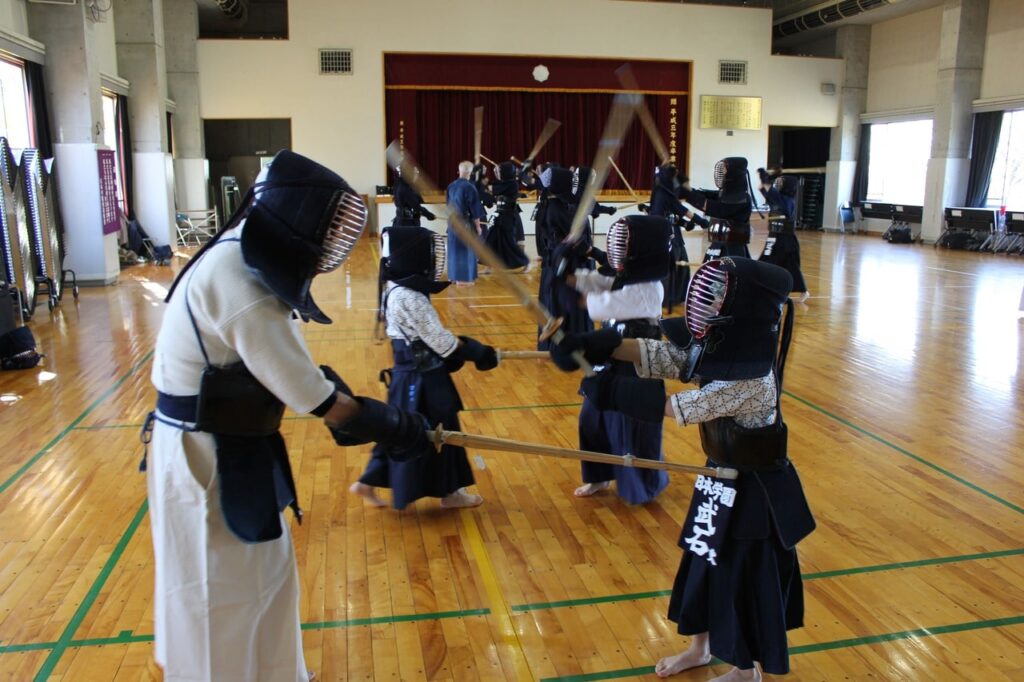
Kendo is more than just a martial art; it is a spiritual training that has a deep impact on the mind and body of those who participate.
Through Kendo, many people have experienced improving aspects of their personality such as self-control, perseverance, and self-confidence.
In this article, we will explore in detail the psychological effects of Kendo and the changes it brings to an individual’s personality.
We will use specific examples to explain how Kendo training can positively impact people’s daily lives, interpersonal relationships, and even behavior in the workplace.
Now let’s see how Kendo shapes and improves our character.
目次
- 1 Introduction: What is Kendo?
- 2 Effects of Kendo on personality
- 3 Psychological changes brought about by Kendo practice
- 4 Kendo and social skills: Improving communication skills
- 5 Examples of actual changes that Kendo has on personality
- 6 Long-term benefits of continuing Kendo
- 7 Steps to start Kendo
- 8 Summary: Summary of personality changes due to Kendo and its significance
Introduction: What is Kendo?
Kendo is a traditional Japanese martial art whose origins date back hundreds of years.
Originally, it was based on swordsmanship practiced by samurai to hone their combat skills, but in modern times, spiritual training as a “do” has also come to be valued.
Basics of Kendo
The basics of kendo is to compete with accurate and detailed techniques while measuring the psychological distance between you and your opponent.
The main tools used are a bamboo sword called a shinai (shinai) and armor to protect the area that will be hit.
During training, we repeat the basic postures, strikes, and thrusts to instill these techniques into our bodies.
The spiritual aspect of Kendo
In Kendo, not only technical improvement but also spiritual growth is extremely important.
Through Kendo training, the spirit of “beginning and ending with courtesy” is cultivated, and values such as “trying hard,” “honesty,” and “respecting others” are valued.
This type of mental education has the effect of increasing self-control and perseverance in daily life, and is one of the reasons why Kendo is respected as a “do” rather than just a sport.
This martial art includes many elements that train not only the body but also the mind, and the inner strength you gain from learning Kendo is a unique feature not found in any other sport.
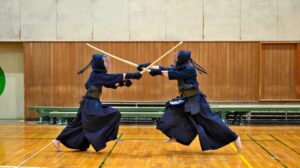
Effects of Kendo on personality
Kendo offers more than just physical training.
Let’s take a closer look at how this martial art affects aspects of personality such as mental focus, perseverance, and self-control.
Improved mental concentration
Kendo training requires a high level of concentration at all times.
Instant judgment is required to accurately read your opponent’s movements and execute techniques at the right time.
By repeating this kind of training, your concentration will naturally improve in your daily life, and you will be able to complete tasks more efficiently.
Improving your ability to concentrate is directly linked to improving your academic and work performance.
Developing patience and self-control
Kendo requires a lot of repeated practice, and it takes time and effort to master the techniques.
Through this process, those learning Kendo can greatly develop their patience.
Additionally, the Kendo environment, which requires strict rules and etiquette, is a great place to learn self-control.
The ability to control your emotions during a game is an important skill that helps you in other social situations as well.
In this way, Kendo gradually forms an individual’s character and develops a more patient and self-disciplined person.
These trainings and experiences in Kendo often result in positive changes in the personality of the participants.
This allows individuals to feel more confident and proactive in tackling daily challenges.

Psychological changes brought about by Kendo practice
Kendo practice provides many psychological benefits to participants.
In particular, improved self-confidence and enhanced stress management skills are important changes that many people who continue to practice Kendo experience.
improved confidence
In Kendo, the continuous improvement of technique and the sense of individual accomplishment lead to confidence.
As your technique improves through Kendo practice, your sense of self-efficacy increases.
This gives you the courage to believe in your own abilities and take on new challenges.
Furthermore, successful experiences in competition often increase self-esteem and have a positive impact on other aspects of life.
In this way, Kendo fundamentally strengthens participants’ self-confidence and encourages a positive attitude in many aspects of life.
Strengthening stress management skills
Kendo training is very effective in managing stress because it requires you to align your mind and body.
The concentration and mental calm required in kendo can help improve the way you deal with stress in everyday life.
For example, deep breathing and meditative elements learned during training can help you stay calm in difficult situations.
Additionally, the physical activity itself helps relieve stress, and the healthy exercise provided by Kendo also contributes to mental stability.
These psychological changes achieved through practicing Kendo not only improve the quality of an individual’s life, but also have the potential to contribute to the welfare of society as a whole.
Kendo is thus more than just an athletic activity; it is a cultural practice that offers profound psychological and spiritual benefits.
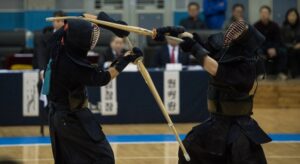
Kendo offers more than just physical training, and has a particularly notable effect on improving social skills.
Kendo enhances people’s interpersonal skills by developing communication skills, teamwork, and a culture of courtesy and respect.
Fostering teamwork and cooperation
While Kendo is a martial art that focuses on honing individual skills, training in the dojo is basically a group activity.
The process of working together with fellow students and improving each other’s skills naturally fosters teamwork and cooperation.
In team competitions and demonstrations, each individual’s movements affect the performance of the entire team, so coordination is the key to success.
This kind of environment provides an ideal place for participants to develop their ability to collaborate.
Relationship between culture of courtesy and respect
Kendo has an important principle of “beginning and ending with courtesy,” and this is a social skill that comes naturally through Kendo practice.
Kendo training requires polite behavior that shows respect for the opponent.
Although they face each other as enemies during games, they foster a spirit of respect and respect by showing their gratitude to each other after the games.
This culture forms the basis for those who learn Kendo to respect others and build good relationships in their daily lives.
These skills learned through Kendo will help you build relationships in a variety of social settings, including school, work, and home.
Improving communication skills and knowing etiquette are important elements for living a more harmonious social life.
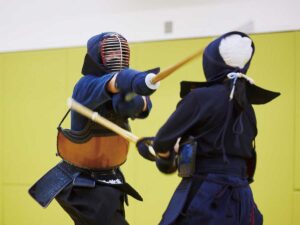
Examples of actual changes that Kendo has on personality
In order to understand the changes Kendo can bring to an individual’s personality and daily life, it is very useful to hear the experiences of people who have actually taken up Kendo.
Here are some testimonies about the changes they have experienced through Kendo.
Story 1: Gaining mental strength
“Since I started Kendo, my mental strength has definitely improved. I used to get easily irritated, but through Kendo training I learned how to calm down. Importance also helps me manage stress in my daily life.”
Story 2: Improved sociability and confidence
“My experience at a Kendo dojo gave me a new social outlet and provided me with the opportunity to make many friends. I also gained confidence as my skills improved. It also helps me when giving presentations and expressing my opinions at meetings.”
Story 3: Improved patience and self-control
“By continuing to practice Kendo, I feel that I have become much more patient than before.During practice, I learned that it takes time to hone your technique, and the importance of steadily accumulating effort rather than seeking immediate results. This perseverance has also helped me when tackling difficult projects.”
Story 4: Recognizing the importance of courtesy and respect
“Etiquette is very important in Kendo. By bowing before and after you start practicing, you show respect to your opponent. This custom has permeated into my daily life, and the way I interact with people has become more I’ve become more polite. This has helped me build better relationships both at work and in my private life.”
These testimonies show the real impact that kendo has on the personality and behavior of its participants, making it clear that kendo is not just an athletic activity, but also contributes greatly to character development.
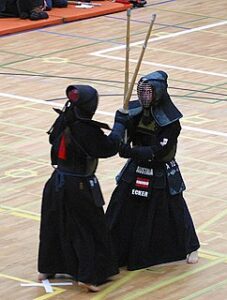
Long-term benefits of continuing Kendo
Practicing Kendo over a long period of time brings many benefits beyond simply improving your technique.
Here, we will delve into the psychological benefits and improved quality of life that can be gained by continuing to practice Kendo.
Mental benefits that can be obtained by continuing
Practicing Kendo over a long period of time can greatly improve your mental strength and peace of mind.
Kendo training teaches you how to keep your mind calm, techniques to improve your concentration, and the ability to control your emotions.
These skills develop the ability to withstand stress and effectively cope with problems in a variety of situations in daily life.
Kendo also requires goal-setting and sustained efforts to achieve it, so you can feel a sense of accomplishment in self-actualization, which leads to self-confidence and self-satisfaction.
Improving quality of life
There are many health benefits to continuing Kendo.
Regular exercise promotes physical health and supports an active lifestyle.
Along with the mental benefits, Kendo contributes to improved sleep quality, higher energy levels, and a general sense of well-being.
Additionally, the social aspect of kendo strengthens social connections, reduces feelings of loneliness, and expands your support network.
The combination of all these factors improves your overall quality of life and allows you to live a more fulfilling life.
Continuing Kendo is an important element for developing not only your body but also your mind and enriching your daily life.
These long-term benefits show that Kendo is more than just a sport, it’s an activity worth pursuing throughout your life.

Steps to start Kendo
In order to start Kendo, it is important to choose an appropriate dojo and prepare the necessary equipment.
By following these basic steps, you can smoothly enter the world of Kendo.
How to choose a dojo
When choosing a place to learn Kendo, you should consider several factors.
First, check whether the dojo is located in an easily accessible location.
Next, it is important to check the qualifications and experience of the instructor and check whether the dojo has a good reputation.
It is also important to consider whether the class schedule provided by the dojo fits your lifestyle and whether the training environment is suitable for you.
If possible, it’s a good idea to visit the dojo in person to get a feel for the atmosphere and consider whether you’ll be compatible with other students or instructors.
Necessary equipment and preparation
To begin Kendo, you will need basic equipment.
Beginners mainly need a bamboo sword and kendo wear (hakama and jacket). A shinai is a mock sword used for practicing kendo techniques, and the size should be chosen according to your height and arm length.
It is important to choose a kendo uniform that is easy to move in and is suitable for kendo practice.
This equipment can often be purchased at the dojo itself, but there is also the option of purchasing it at specialty stores.
Once you’ve prepared your equipment, it’s important to learn how to properly wear and maintain it, and to always store it properly.
By following these steps, you will be ready to begin practicing Kendo and will be able to learn the technique safely and effectively.

Summary: Summary of personality changes due to Kendo and its significance
Kendo is more than just a physical activity, it is a spiritual training that has a deep impact on the character of its participants.
Throughout this article, we have delved into how Kendo shapes and improves an individual’s character.
To summarize, let’s review the main points of personality changes caused by Kendo and their significance.
Kendo and personality change
By continuing Kendo, it is common for individuals to experience personality changes such as:
- Improves mental focus and self-control. Task management and stress tolerance in daily life will be strengthened.
- Develops patience and persistence. You will gain the strength to continue working toward long-term goals.
- Develops confidence and improves sociability. Fear of interacting with new environments and people decreases, and more positive interpersonal relationships develop.
- Learn the importance of courtesy and respect. The quality of relationships in social life will improve.
The significance of Kendo
These personality changes in Kendo not only enrich the individual’s inner life, but also have a positive effect on the person’s social life.
Kendo gives participants the opportunity to deepen their self-awareness and provides a means to improve how they interact with others.
This allows Kendo to contribute to the harmony and well-being of not only the individual but the entire community to which he or she belongs.
These personality changes achieved through Kendo are often directly linked to success and happiness in various aspects of life.
This makes Kendo an attractive option for many people, as it is a deeply spiritual activity that is more than just physical training.
